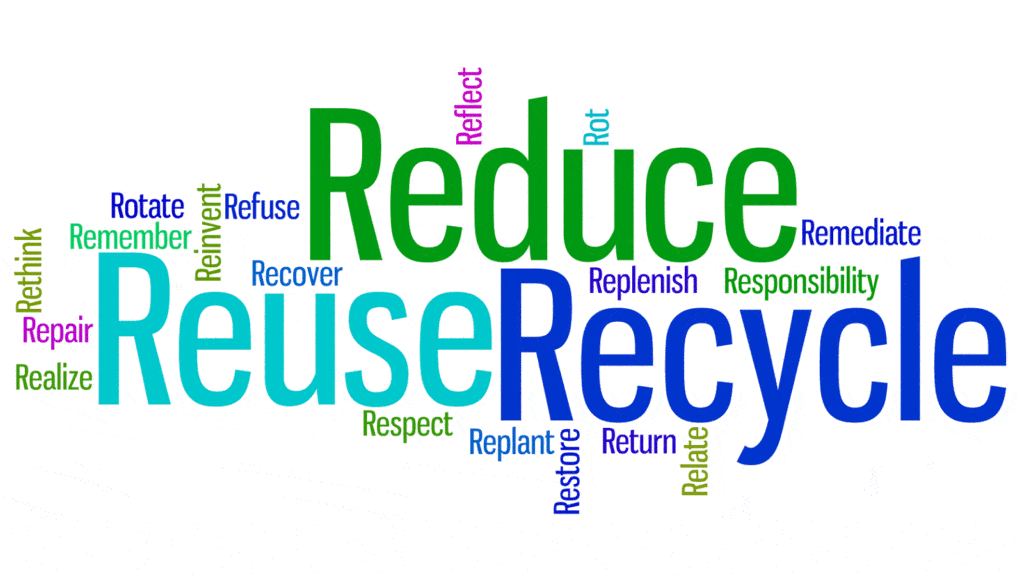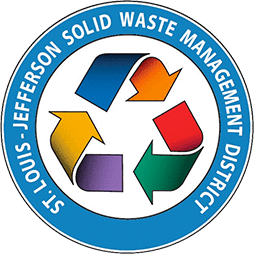
We are very familiar with the 3 R’s: Reduce, Reuse and Recycle. But let’s take it a step further! Did you know there are more than just 3 R’s you can practice everyday? Get your creative thinking hat on and let’s see what other everyday sustainable practices you can implement! You might practice these more than you think…

To begin, many of these practices are not solely in one category or another, but rather they overlap with their closest pyramid partner. Rarely are you just practicing one of these R’s alone. Usually, if you are doing one of these R’s, you are, in fact, doing several R’s at the same time because they are interconnected practices.
Rethink or Refuse
Rethink
Our culture has been built around saying, “Yes,” which makes saying, “No,” feel counter-intuitive. In this day in age, no human can live without producing some amount of waste during their lifetime. We live in a linear economy where products are made and, unfortunately, the end of life is rarely considered by the manufacturer. A good example of this is K-cup. The inventor of K-cup didn’t consider the end of life of the disposable K-cups, and now regrets creating this machine.

In a circular economy, the product’s end of life is a part of the discussion in hopes to find responsible, accessible ways to create little to no waste for the user. Many of us are not product inventors, however, we still have the opportunity to shift our focus to seek responsible companies and products.
The goal of “Rethink” or “Refuse” is to take a second or two before we purchase and take “free” items to think about the lifecycle of the product. How was it made? How long will it last? Where does it go at the end of its useful life? A great example of this is thinking, “Do I need a plastic produce bag for this bunch of bananas?” Produce with thick, inedible peels, like bananas, avocados, onions, etc., doesn’t need a bag. This helps reduce the number of plastic bags we use. Write a reminder note to bring your mug to the coffee shop or pack reusable utensils rather than relying on one-time-use disposables.
Refuse
Recently, we hear a lot more people saying “No” to straws and other plastic items, such as plastic bags, bottled water and plastic utensils. Several organizations have brought to light the dangers of small plastics in our environment and ocean. This movement has started a new conversation about the materials we consume everyday and created a mindset shift about disposable items we use often and throw away once finished.

While movements such as “Skip The Straw” might seem insignificant, they really bring to light a deeper issue about what resources were used to make products. Movements are effective because they can spark interest in an unknown topic which then can bring awareness about consumption of finite resources, such as oil (plastic), bauxite (aluminum) and sand (glass). Reframing our needs and wants allows us to be more mindful when making choices that will produce waste.
As mentioned earlier, we live in a world where we need products and packaging is unavoidable sometimes. If you need to buy a product, consider asking yourself these questions. How regularly do I buy this product? Can I purchase this in a larger quantity with less packaging? Is there a similar product with less packaging? Could I buy directly from the manufacturer? The purpose of “Rethink” and “Refuse” is not to create any waste, but looking for other solutions that are less wasteful.
Several stores have made this easier for the consumer to avoid excess packaging without having to think or refuse options. Package Free, Tiny Yellow Bungalow, Life Without Plastic and the Wild Minimalist are a few great online options for zero or low waste home goods.
Reduce or Rent
Reduce
In a nutshell, reducing is using less of something. We need things in life, but how can you minimize the usage and dependance on items while also maintaining your needs? It is possible to do this while limiting your waste.

Take paper towels for example. Messes in the kitchen are inevitable. But how many paper towels are you using in your household each day, month or year? Are they necessary for every spill? Could a reusable hand towel be used instead? If a paper towel is necessary for a spill, could you use one paper towel instead of two or three?
Sometimes reducing waste means making the reusable option more accessible to you. For example, place reusable towels where they are visible and near where spills happen so they are the first thing to grab instead of the paper towels. Having enough reusable hand towels in a drawer to grab is important to continue to build the habit of going to the reusable option first. Check out our blog post on Sustainable Bathroom Swaps for more ideas to reduce waste in the bathroom!
We get it! Sometimes you prefer disposable, but maybe you can find more sustainable disposable options. There are reusable bamboo paper towels that can be washed several times and then are compostable at the end of their life. Paper towels that are made from 100% recycled content is another sustainable choice if you prefer disposables. While this is only one example, it is meant to get you to think about questions to ask yourself regarding other disposable options you use daily.
Rent

Renting can also be known as borrowing. While it might take some effort to find options, it can save you money in the long run.
Practically, what does this look like? If your a student, you know all too well about renting textbooks because buying all your books can cost just as much as the class. It’s fun to host a party, but having all the supplies on hand is not always feasible. Check to see if you can borrow dishes, utensils and serving dishes or platters from family or friends. There are clothing swaps that happen frequently throughout the city if you want to change up your wardrobe without breaking the bank. Did you know Home Depot loans out equipment to use at a reduced cost? Renting equipment for a Do-It-Yourself (DIY) project may be in your future! Finally, there are Buy Nothing groups where you can find local items to ask for or lend to others in your area.
Repair or Reuse
Repair
Scan the room you are in now. What items do you see that you may toss in the trash once broken? Or before you recycle that item, could it be used in your latest craft project? Typically, items are created with a single purpose in mind. But there can be more than one use for an item, usually.

For example, what about the shirt or jeans you are wearing? If you get a hole, stain or a button goes missing, what do you typically do with these clothing items? Donation is not usually an option for clothes with these issues. However, can you repair a missing button? If the stain is too deep or the hole too large, what about reusing your clothing to make one of these items!
Sometimes the skills we need are not something in our wheelhouse and that’s okay! There are others who enjoy fixing buttons and resoling shoes and many local shops provide these services. If it’s not something that is affordable, consider timebanking. Timebanking is a great way for the community share skills without paying.
Reuse
Instead of buying something new or throwing materials away, how can you repurpose items you may need or want? It’s time to put your creative hat on and roll up your sleeves to refine your DIY skills. Online videos, blogs and the library are great resources to help you gain new skills. Perennial has low cost classes to learn new skills while creating a great DIY project from materials that would have otherwise gone to the landfill. Refab sells second-hand hardware and building materials at a lower cost and that are perfect for your DIY projects.

It’s important to think about our thought process of waste reduction, so we don’t overlook the other uses materials may have. Once we open our mind up to rethinking, the possibilities are endless for reuse and repair!
Go the extra step and think ahead. If you need to buy new, consider if the new item could have an alternative use when you are finished with it.
Check out Part 2 of Beyond the 3 R’s to find out more ways to everyday sustainable practices.
Sources
The 7 R’s to Zero Waste: How to Live Without Excess
Practicing the ‘7 R’s’ lifestyle
The Seven Rs of Responsible Recycling









1 Trackback